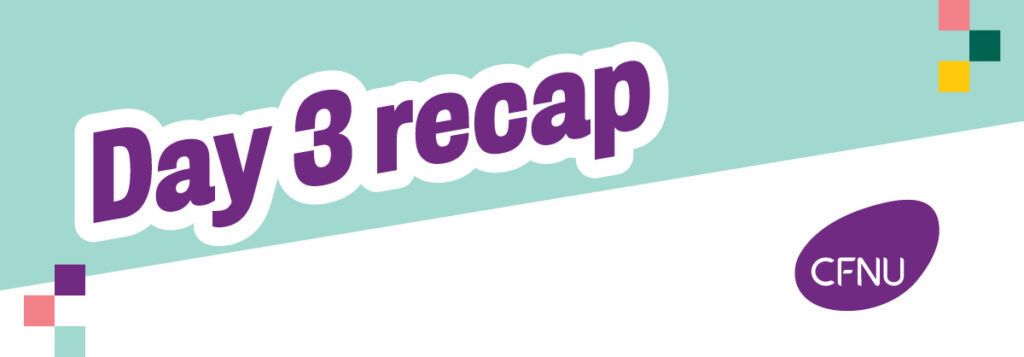
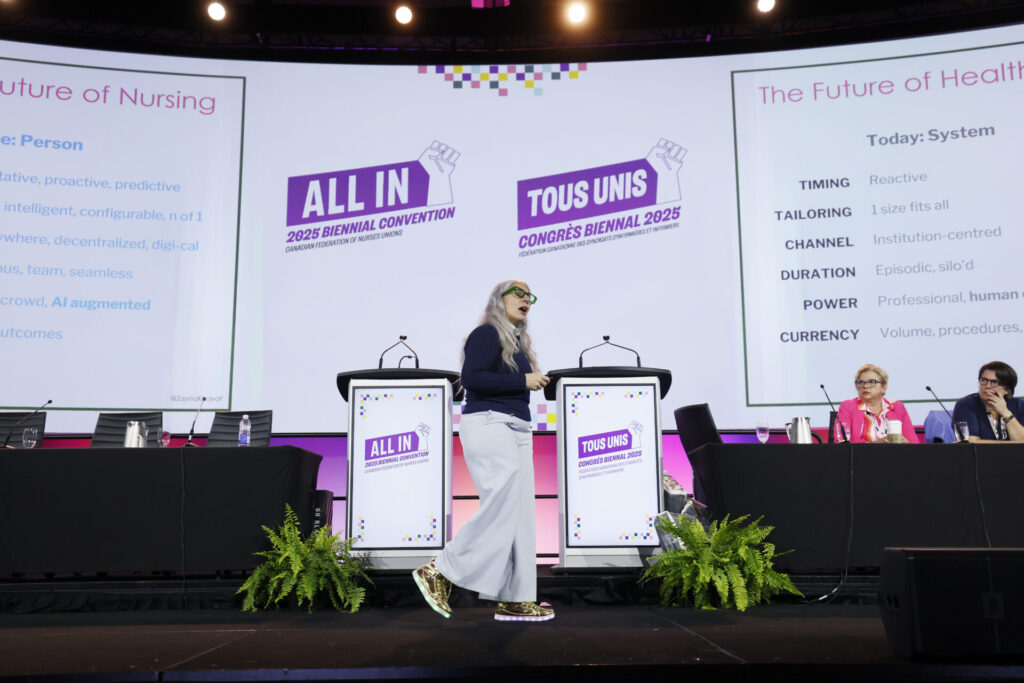
According to Dr. Zayna Khayat, futurist and keynote speaker at the Wednesday morning plenary session, “nobody loses a job in medicine… especially nurses” because of Artificial Intelligence.
“We can’t face this future without nurses,” said Dr. Khayat. Khayat is an applied health futurist at Deloitte, a consulting, accounting and legal services corporation.
“We are the most labour-intensive sector in the world,” she explained. “They’ll never train enough nurses, enough doctors… to meet the complex needs of their populations.”
The inevitable result, she predicted, is that AI will make big changes in the practice of medicine, including the work of nurses. But she says how we think about AI needs to change from AI – “artificial intelligence”, to IA – “intelligence augmented.”
AI “…is not replacing the work that humans do, it’s augmenting the work that we do, because machines are very fast, they’re extremely accurate, but they’re really stupid, right? And us, humans, we’re the opposite. We’re slow, we’re inaccurate, but we’re brilliant!”, she said.
AI can allow us to augment our human brilliance with the tireless accuracy and efficiency of the digital age, she said, arguing that this is what drives the move to AI.
A driving factor, Dr. Khayat said, is that the demand for nurses vastly exceeds the supply. And AI can help compensate for the shortage of medical professionals.
However, Dr. Khayat warned, this optimistic paradigm is not without risks. For example, she asked, who gets to decide how to resolve moral dilemmas in health care?
“The last thing we want is the manufacturers of all this AI to set those algorithms,” she said. “We let it get away from us with social media. We cannot let it happen with AI.”
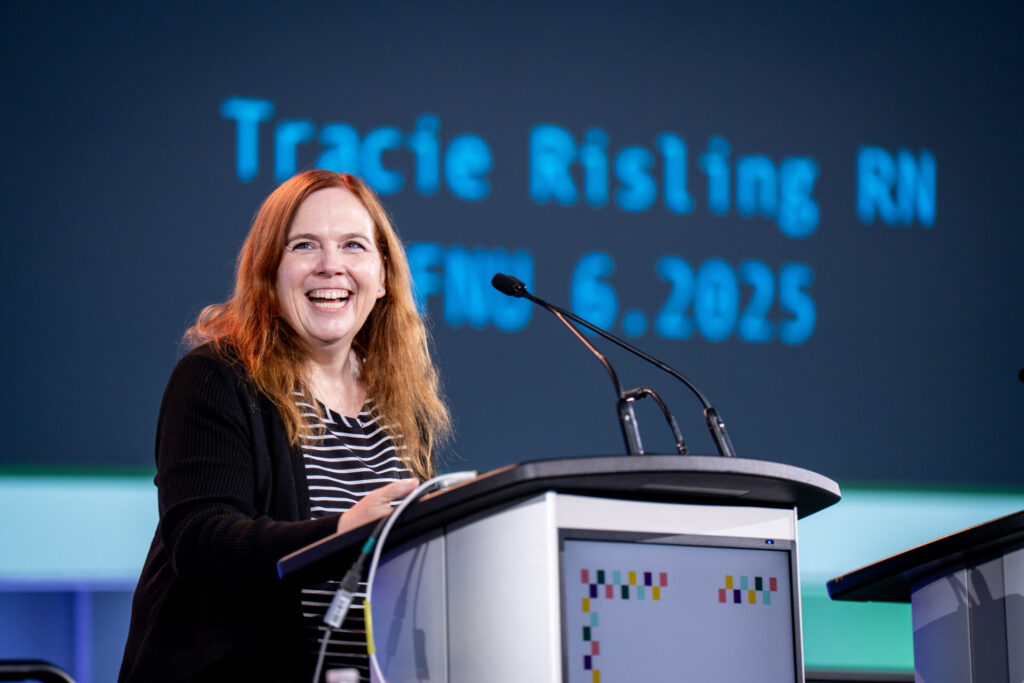
Artificial intelligence is moving fast in health care. But as one panelist put it with a smile, when it comes to keeping care compassionate and ethical, “there’s a nurse for that.”
The “AI Health: Today & Tomorrow” panel brought a thoughtful, balanced look at how AI is already shaping patient care and why nurses need to be at the center of it all.
Dr. Muhammad Mamdani kicked things off with real success stories. His team’s CHARTWatch tool monitors patients in real time, helping prevent serious declines. In one hospital, it cut unexpected deaths by more than a quarter. AI scribes are saving nurses’ and physicians’ hours each week, easing the documentation burden.
“These tools are working, but only if we implement them responsibly,” he warned.
While Dr. Mamdani showcased AI’s promise, other panelists offered an important reality check, especially when it comes to how AI is being deployed on the ground.
Chris Nielsen, from National Nurses United in the USA, pulled no punches. AI is powerful, yes. But it’s also being driven by corporate interests aiming to cut costs.
“We’re seeing it used to replace nurses, to reduce human input,” he said. “But nurses don’t just follow orders. They think, they feel, they advocate. Human intelligence is required to make artificial intelligence work.”
His message was clear: nurses must be directly involved in how AI is developed and used. They need the authority to override decisions that don’t make clinical sense.
“AI can’t take your place,” he said. “But it might try, unless we set the rules.”
That call for human oversight continued with Tracie Risling, RN, who brought heart and humour to the discussion.
“AI is at the ‘advanced beginner’ stage,” she joked. “It needs mentoring. And there’s a nurse for that.”
Her message landed with the crowd: “We need to keep the heart in this science. And you are the nurse for that.”
AI isn’t going away. As it becomes part of everyday practice, nurses must take the lead. And not just in using these tools – but in shaping them. It’s up to us to ensure these tools reflect the values nurses bring to health care – critical values like compassion, ethics and human connection. There’s no substitute for that. And when care needs a conscience, there’s a nurse for that.
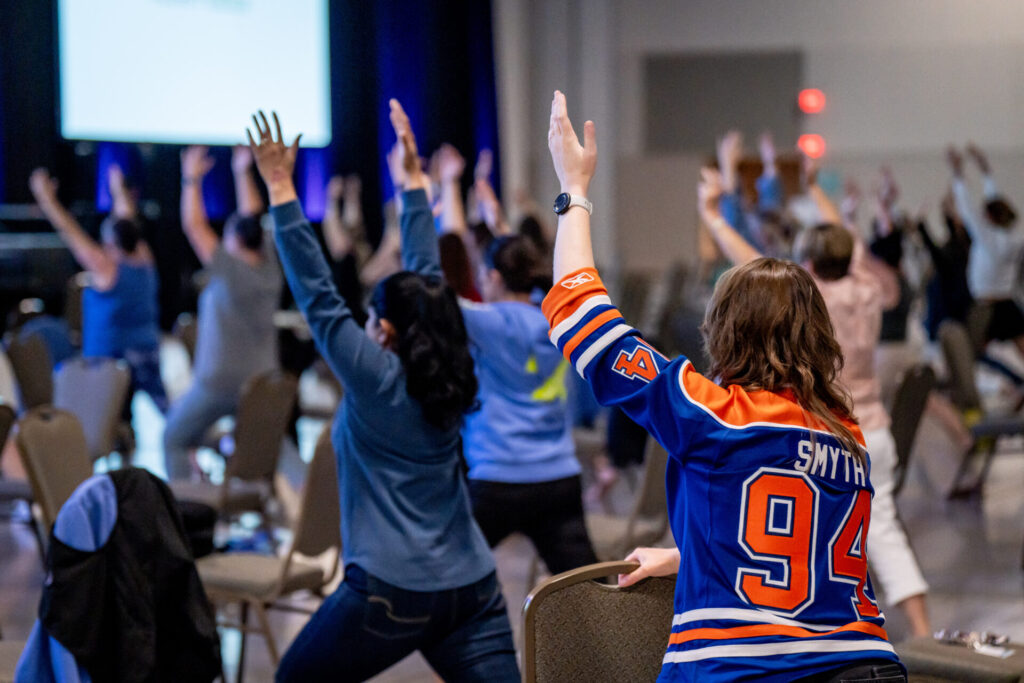
In a workshop that blended mindful movement with practical conflict navigation, nurses discovered a new way to approach disputes – starting from within.
Led by Barb Campbell and Lee Coughlan of United Nurses of Alberta, Yoga and dispute resolution was less about downward dogs and more about leaning into discomfort. Through gentle chair-based yoga and guided self-reflection, participants explored how breath, posture and stillness can inform how we show up in high-stakes conversations, union negotiations and moments of emotional intensity.
“We settle our bodies to settle the room,” one facilitator shared, inviting nurses to consider how internal regulation precedes external resolution.
This session was highly interactive, inviting open dialogue and embodied practice. Participants were encouraged to “stop being so hard on [them]selves” and to notice how often the mind tries to override the body’s wisdom.
As nurses, we encounter conflict in countless forms – on the unit, in negotiations and in our personal lives. With so many intersections and energy demands, a mindful process allows us to pause, reconnect with awareness and move forward with clarity.
Attendees examined the science behind how yoga “prepares and repairs” those who regularly engage in dispute management. They reflected on the distinction between managing and resolving conflict, and how compromise, while sometimes necessary, isn’t always the end goal.
There was a strong focus on the connection between mind and body – on how mindfulness and movement can offer much-needed respite from the high frequency of a busy life.
What made the workshop especially powerful was its real-world application to labour relations. Nurses discussed how mindful awareness can de-escalate emotionally charged exchanges, create space for creative problem-solving and prevent reactive decision-making. “We can’t control the waves,” Campbell noted, “but we can learn to steady ourselves in the storm.”
In a profession where tension is constant and advocacy is key, this workshop reminded us: peace isn’t passive. It’s practiced.
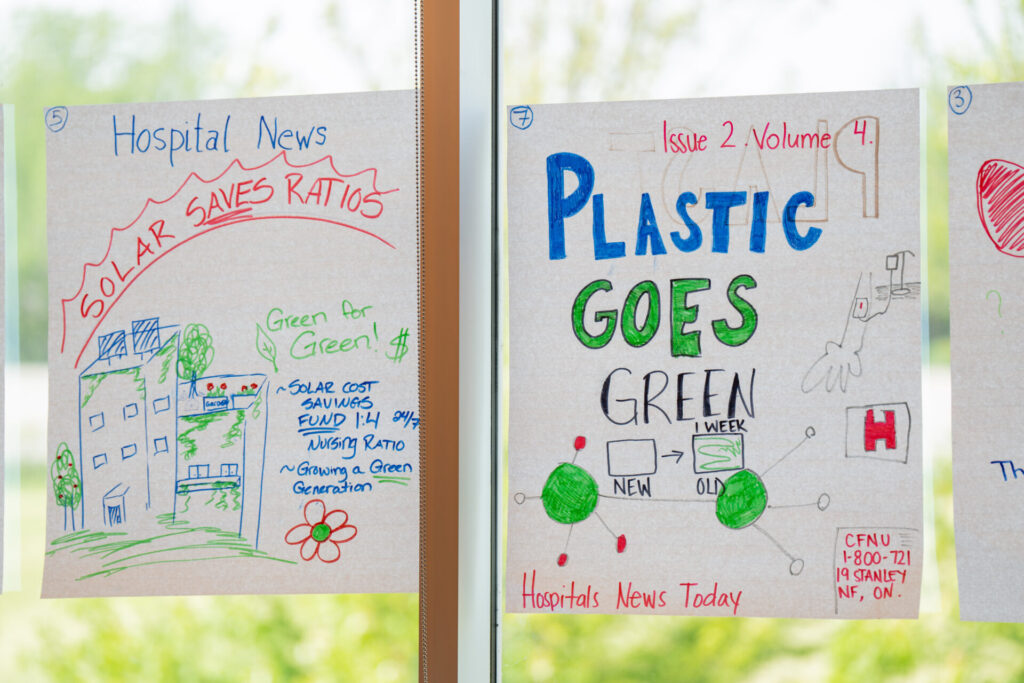
Fact: If the health care sector were a country, it would be the fifth highest greenhouse gas emitting country in the world.
Participants at the Climate change and health: Implications for nursing and health care practice workshop learned about sustainable health systems and how to harness opportunities for change. Nurses have a crucial role to play in addressing the impacts of climate change and being leading advocates for sustainability.
“We see changes in extreme weather, habitat loss, soil loss… and our health depends on the health of the environment,” said workshop facilitator Nicole Simms, Education and Training Lead at CASCADES. “Climate change impacts our health: heat-related illnesses, PTSD, asthma, infection, malnutrition. We need to develop responses to address it.”
For instance, an estimated one fifth of prescriptions, one fourth of tests and one tenth of procedures are thought to be potentially unnecessary, according to The Lancet.
“To reduce emissions from supply of health services: are there ways to make care more sustainable? For example, can there be a reduction of single-use items?” asked Simms.
“What areas of opportunity of sustainability can you identify?” Teri Forster, CFNU Climate and Planetary Health Lead, asked participants, who provided dozens of responses about recycling, thrifting, transitioning to a digital file system and avoiding printing documents.
Forster, who is a BC Nurses’ Union Regional Council Member, notes: “It’s about making different choices, so that we don’t create waste to begin with.”
Forster highlighted that the CFNU developed an excellent resource – Nursing Toolkit for Planetary Health – which provides information and resources for a more sustainable, resilient and low-carbon health care system at:
“Climate change and health care are so intertwined, so how do we make sustainable change to prevent emissions,” said workshop participant and BCNU member Genevieve Dallimore. “Through each of the speakers, this workshop highlighted how we can lobby at local and systems levels to bring new ideas forward for sustainability.”
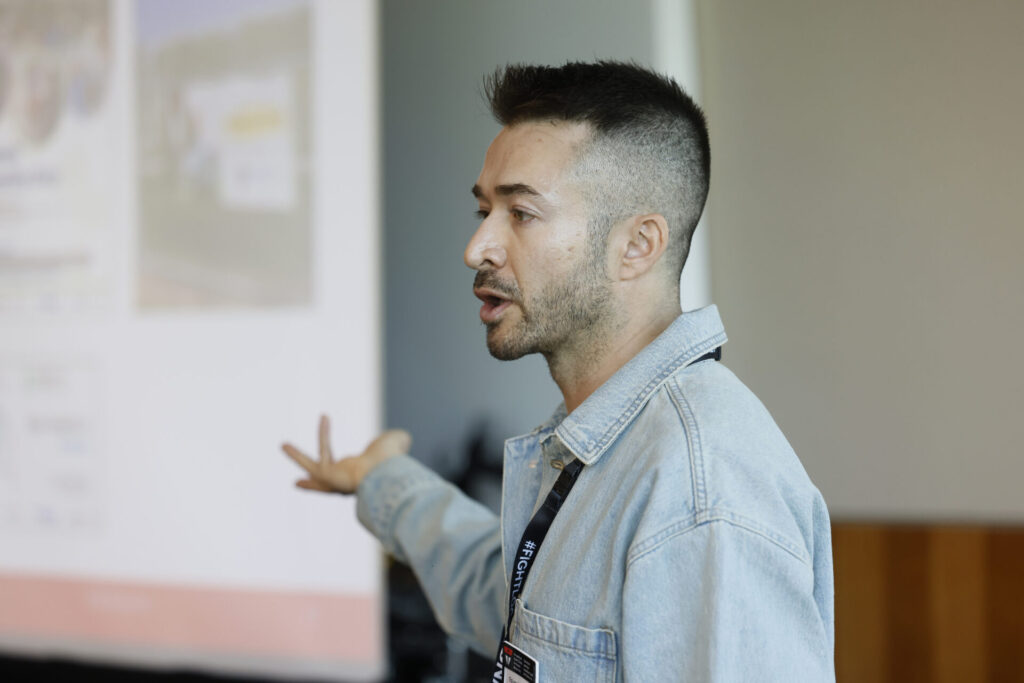
Nurses eager to deepen their understanding of the challenges faced by migrant workers filed into room 205 for the Understanding the migrant worker experience: a health care perspective workshop.
The session, facilitated by Michelle Tew, an Occupational Health Nurse, and Eduardo Huesca from the Occupational Health Clinics for Ontario Workers (OHCOW), offered a compelling look at how systemic barriers impact migrant health, and how informed and compassionate care can make all the difference.
One participant, who noted that there are a lot of migrant workers in the community she works in, said: “I’m here to learn about the challenges and opportunities so I can provide the best care to migrant workers.”
Migrant workers, especially those under the Temporary Foreign Worker Program, play a vital role in Canada’s economy, particularly in agriculture and manufacturing. As Tew pointed out, despite the contributions of migrant workers, many face precarious working conditions, limited rights and little access to support when things go wrong.
“Many migrant workers avoid filing workplace injury claims due to fear of retaliation or deportation, and this type of system contributes to fear, stress and injury,” explained Tew.
Huesca added that while migrant workers are not inherently vulnerable, their immigration status, housing conditions and language barriers make them structurally vulnerable.
“COVID-19 exposed issues like language barriers and overcrowded housing, but the sad truth is many of the conditions that make migrant workers vulnerable still haven’t changed,” he said.
For nurses, awareness is key.
“Understanding these issues helps nurses not only deliver better care,” said Tew, “but also advocate more effectively.”